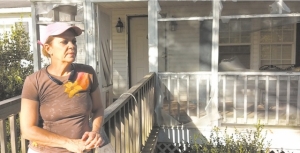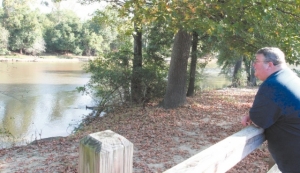Hurricane Matthew: One year later ---- Finding a new home
By Steve Herring
Published in News on October 8, 2017 1:45 AM

News-Argus/STEVE HERRING
Teresa Kilpatrick stands in front of her mother's home that was flooded in Seven Springs during Hurricane Matthew. Kilpatrick said she and her mother, Jewel, will not stay in Seven Springs after flooding and looters destroyed their home.

News-Argus/STEVE HERRING
Stephen Potter, mayor of Seven Springs, looks out at the Neuse River. He said flood recovery is a long process, but he believes, though the recovery process is slow, the town will eventually recover. Potter said the greatest thing that has happen so far is the reopening of Mae's Restaurant in June.
SEVEN SPRINGS -- Teresa Kilpatrick and her mother, Jewel, will move into their new home one year after Hurricane Matthew's historic flooding forced them to flee their old home.
"The home has been placed on her farm and hopefully we can be in by the first anniversary of Hurricane Matthew," she said. "That is what we are hoping for."
Kilpatrick was standing in front of her house damaged first by the histo ric floodwaters of Hurricane Matthew and then by vandals and looters.
Her mother was mayor of Seven Springs and helped lead its recovery after Hurricane Floyd flooded the town.
"I have lived in Seven Springs all my life. My mom is 85 years old and she has lived here all of her life. She has been through several floods. When Hurricane Matthew came through it pretty much wiped her out, physically and mentally.
"She would love to come back because this is where she was born and raised, but she is not able to go through another flood. I have been through two myself, and it takes a big toll on you, both physically and mentally."
Fortunately her mother had a farm on higher ground on Mt. Zion Church Road, closer to Mount Olive.
That is where she will now be setting up residence.
The Seven Springs house probably will be demolished, she said.
"There may be some pieces that we can salvage, but not much," she said. "We have had hordes come down and go through everything that we did have left of any value and took it with them -- a lot of stuff that had sentimental value as well.
"But this will always be home for both my mom and me and my children. But we won't be taking up residence here again because we just can't handle the flooding anymore."
For Mayor Stephen Potter, it is stories like the Kilpatricks' that have proven to be the most difficult to deal with.
"The hardest part has been seeing people displaced by the flood -- people who are part of the community, who love the community and are loved by others in the community -- and not being able to get back home," he said.
"I know some of them have gone out and built other homes but there is a part of them that is still here. I know how sad that makes them not to be here. We have some who desparately want to get back and find a way to make that happen."
Potter said he is amused whenever he hears people talking about how great the flood recovery is going.
There is no such thing as a great flood recovery, he said.
"Everyone is affected and the impact is long term," he said. "It completely changes your life. It's a slow process and that has been the frustrating thing.
"Floods are nothing new to us down here, but I think this level of flood is not really something we were anticipating having to deal with anytime soon."
It is difficult to talk about the flood, but he and others in the town are asked about the experience over and over, especially as the first anniversary approaches -- forcing them to constantly relive it, he said.
Some news accounts have painted the town as taking its dying gasp, he said.
"I am not giving up on this town, and the town board is not giving up on this town," Potter said. "I think the vast majority of the citizens down here are not giving up on this town. I get asked that question a lot, and I am beginning to lose patience because, really, is that all you came down here to ask me?
"I am not at that point," Potter said. "We have time. We are not broke. We are trying to work with FEMA (Federal Emergency Management Agency) to see what we can do, how we can best move forward. There are some tough choices to make."
Potter said he knew the recovery was not done. He doubts it will done in three years.
Rather, it is going to be an ongoing process.
"What we have said from the beginning is that we have got to find a way to generate revenue that is going to replace that tax base," he said. "Or we are going to have to cut our expenditures enough to survive within the parameters of what we have."
The fortunate thing for the town is that it has been frugal -- it has a fund balance that will keep it afloat for several years if necessary, Potter said
"So we are not going to run into financial trouble anytime soon as far as surviving as an entity. That may come, but no time soon, and the reports of the town's death have been greatly exaggerated," Potter said paraphrasing Mark Twain.
"So we will see where we are. As long as we stay on a track on getting that revenue replaced in a two-to-four year kind of time frame, then I think we will be OK."
The town had 115 residents prior to the flooding. There are many rental properties, so people came and went making an exact count difficult.
"I am guessing there are now 50 to 55 people inside the town limits," he said. "We hope to have more come back. One of the saving graces for us might well be that so much of the property down here is rental, because they won't get bought out and people will have to make decisions about what they are going to do with that property -- let it sit and pay taxes on it or do you try to fix it.
"There is a chance for low-interest loans this coming year, I think for those properties."
There has been some movement, the Methodist parsonage has been sold, a potential buyer has expressed an interest in the old bank building and the post office is expected to open soon.
Potter said the greatest thing that has happenned so far is the reopening of Mae's Restaurant in June.
Jackie Rouse, who operates the restaurant, is serving up homecooked meals, and something even more important -- hope and optimism in a community where both have been in short supply since Hurricane Matthew left the county's oldest town under several feet of water.
"This was a godsend for us and gives us a community center," Potter said.
It has inspired the town, because with no business and traffic Seven Springs looked like a ghost town, he said.
Potter is working to get a farmer's market set up on Main Street across from his house.
Neuse River Trader is expected to reopen in January.
According to the state Department of Transportation, 1,400 vehicles travel Main Street daily so there is a potential for business, Potter said.
"We just have to find a way to get those people to stop," he said.
The Christmas Parade, canceled last year because of the flood, will be held this November. Depending on the turnout, the town will look at bringing back its Old Timey Days festival next spring.
The town has to make a decision about the flooded town hall, whether to renovate or look at new locations such as renting space next to the restaurant or possibly renovating the old rescue squad building.
The rescue squad will be moving to a new station near Spring Creek High School, and the fire department is looking at locating just west of Main Street.
"It is going to be a slow process," Potter said. "I think we are about where I expected we would be. This is going to be much harder to come back from than (Hurricane Floyd) was. First of all, the assistance that is out is not what it was after the flood after Floyd. I think FEMA came through and bought about anything anybody wanted to sell.
"It is a lot different. Funds are a lot tighter this time. As far as coming back, about as expected. I knew it wasn't going to happen overnight."
Potter thinks that most residents who were flooded out will go for the federal buyout program.
The empty lots could help provide a way for the town to supplement its budget.
Once FEMA buys out the land it no longer generates any tax revenue for the town and no permanent structures can be built on the lots.
The town is looking at developing a town-owned RV park to trade off the very river that has nearly washed away this historic riverside village twice in just the past 17 years.
Seven Springs already has several lots from buyouts in 1996 and 1999 that could be used, he said.
Potter said he would like to see a more visible sign of movement and that he might ask the town board go ahead and finance a couple of RV sites.
It would be nice to have something to point to and hint at what a larger scale project could mean, he said.
Improvements to the boat landing are possible as well, to attract more activities on the river, he said.
Along with the river, as the county's oldest town, Seven Springs has history that could be promoted as well, he said.
The area around the town was the site of the Civil War Battle of White Hall (the town's prior name) and the wooden hull of the ironclad ram Neuse, a Confederate blockade runner, was laid down in the town.
A public meeting with state and federal officials to talk about the town's options will be held at 10 a.m. Saturday, Oct. 14 at Seven Springs Baptist Church.
